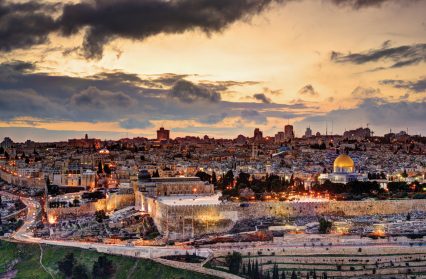
Despite common perceptions that it is impossible to do business in Palestine, the Palestinian economy continues to grow: in 2011 the stock market was the best performing in the Middle East. Dr Elizabeth Stephens talks opportunities for investment.
Palestine, or the Palestinian territories, as the land the Palestinians claim as their ‘homeland’ is often referred to, could never be described as a ‘safe haven’ investment destination. The territories do not have sovereign status, do not control their own land or sea borders or air space and have groups branded by the international community as ‘terrorist’ organisations operating in their midst.
After relative calm in 2013, tensions have risen in recent months between Jewish Israelis, Arab Israelis and Palestinians following the arrival of new Jewish settlers in East Jerusalem, Israel’s July-August offensive in Gaza and the collapse of efforts in April to revive the peace process.
Yet Palestine has the advantage that it is not new to instability and, after decades of living under Israeli occupation, many Palestinian entrepreneurs with resilient, adaptive business models have emerged. As many of the neighbouring territories have been subsumed by conflict engendered by the overthrow of long-established authoritarian leaders, the broader Palestinian economy is proving strong amid the revolutions sweeping the region.
The Palestinian Authority (PA) has created a relatively stable environment for economic growth with the establishment of a clear legislative framework and is taking steps towards good governance and conformity to international standards. With a growing population and a basic level of political stability, in the West Bank at least, the territory offers the potential for favourable returns for the more intrepid investor.
Investment potential
The territories have a population of 4.5 million (1.8 million in Gaza and 2.7 million in the West Bank) of which the majority are young. The labour force in the West Bank and Gaza will expand significantly over the coming years and offer a pool of well-educated, entrepreneurial employees, who are IT-literate and familiar with business practices in overseas markets.
Palestine benefits from its sizeable diaspora population who invests in the territories, with large Palestinian enterprises internationally connected with partnerships extending to Asia, Europe, the Gulf and the Americas.
With a growing number of high-tech-focused college graduates, one of the highest Internet penetration rates in the Middle East, and competitive salaries, software development and outsourcing are considered attractive sectors for potential investors. Multinational companies working with Palestinian companies enjoy lower costs and lower attrition rates than operations in similar markets.
The Palestinian authorities welcome foreign investment and in the more stable West Bank, measures have been taken to create a more hospitable investment environment. The authorities are actively implementing structural reforms, including improved financial accountability and more effective public management, and have established a regulatory framework favourable to foreign investors. Efforts are also being made to develop public infrastructure such as education, hospitals, municipal services, justice system, water networks, electricity, waste treatment and tourism infrastructure.
The PA has taken steps to facilitate and increase foreign trade by signing free trade agreements with the European Union, the European Free Trade Association (EFTA), the United States, Canada and Turkey. The PA has finalised other trade agreements with Russia, Jordan, Egypt, the Gulf States, Morocco and Tunisia.
Private sector support
Private sector investment has been recognised as the key to stimulating growth in Palestine and building a viable state. Behind this is the concept of a ‘peace dividend’ that would provide Palestinians with a stake in the normalisation of the situation in the West Bank. Palestinian reforms are reinforced by international efforts to boost private sector investment. The US$4bn Palestinian Economic Initiative, announced in May 2013, aims to increase the GDP of the West Bank and Gaza by 50% over three years, primarily by driving private sector-led growth. The IPE focuses on eight sectors based on their private sector orientation, employment figures and contribution to GDP: agriculture, construction, tourism, IT, light manufacturing, building materials, energy and water.
Private sector investment is developing a strong track record. In 2008, US company, Cisco Systems, took a leading role in developing the nascent Palestinian IT sector with an investment of US$15mn. In addition to their own direct investments, Cisco brought other high-tech firms into the region to invest in Palestinian firms, including Microsoft, Google, Alcatel-Lucent and Hewlett-Packard, as well as newly-generated funds. Cisco and its high-tech partners, together with investments from organisations including the European Investment Bank (EIB), have pumped more than US$78mn into the Palestinian high-tech sector in the last three years. The total investments, equivalent to 1.6% of Palestine’s GDP as of 2008, is unprecedented. The contribution of IT to the Palestinian economy is expected to reach 8.7% by 2020.
A shift is occurring away from the traditional growth-driving sectors such as energy and automotive, to the new economy driven by technology-intensive sectors. Palestine is well placed to capitalise on this potential. There are more than 300 technology companies in the West Bank and Gaza Strip, with about 3,200 people working on mobile apps and innovative websites
While venture capital investors were initially sceptical that Palestinian start-ups would ever yield good returns, given the changing political climate in the Middle East, the success of technology start-ups in Israel provided a useful parallel. Israeli technology firms faced similar concerns in the 1980s, when many foreign investors refrained from putting money into Israeli technology companies for fear of possible war and because the sector was still unproven.
The power of technology companies is demonstrated by the success of Paltel Group, the Palestine Telecommunications Company. Since its establishment as a public shareholding company in 1997 the Group has grown to contribute around 5% of Palestinian GDP and is the biggest private sector employer with 3,000 staff. Paltel stock represents 33.16% of the total market CAP of the Palestine Exchange (PEX) at the end of 2013 and is demonstrative of the ability of companies, active in key sectors, to operate effectively in Palestine.
Investment challenges
Palestine remains fragmented between two separate political movements that govern the territories. Fatah governs the West Bank, while Hamas, which won democratic elections in 2006 and seized power in June 2007, continues to control the Gaza Strip. Efforts towards the formation of a technocratic unity government in April 2014 were undermined by Israel’s military offensive against Gaza in July 2014, leaving little cohesion between the two ruling factions.
Trade has been hampered by the absence of territorial contiguity between Gaza and the West Bank as both areas are forced to rely on Israel for the external movement of goods. Within the West Bank, Israel controls movement through a network of ‘settler’ highways that divide Palestinian towns and villages, while hundreds of Israeli army checkpoints further delay and restrict the movement of goods and people within the territory.
The Israeli security barrier, designed to prevent suicide bombers entering Israel, provides the clearest physical proof of the separation of Palestine from Israel and the detrimental impact security controls exert on Palestinian trade and livelihoods.
The barrier is 430 miles in length and reaches eight metres in height, including on the western side approximately 9.4% of the West Bank and 23,000 Palestinians.
Trade restrictions are more punitive in Gaza where Israel retains control of all products entering and leaving the territory. The economy is severely thwarted by the ban on almost all exports and the restriction on the import of ‘dual-use’ items. Israel controls Gaza’s power supplies and the means to maintain and repair infrastructure. As a consequence, up to half of the Palestinian population still relies for its basic services on UNRWA, the UN agency for Palestinian refugees.
Infrastructure is periodically damaged by Israeli military incursions or fighting between rival Palestinian factions. A significant number of working days are lost through curfews and closures. Growth fell in 2011 and 2012 to around 5%, from 9% in 2009 and 2010, primarily as a result of unsustainable pressure from Israeli restrictions on the movement of people and goods.
Compounding these physical trade barriers are the financial and bureaucratic restrictions Israel imposes on Palestine. The territories lose 18% of their annual tax revenue and 3.6% of GDP to trade controls imposed by Israel. A report by the United Nations Conference on Trade and Development (Unctad) reveals that restrictions placed on the movement of goods in and out of the territories exerts a ‘disproportionate influence’ on the ability of the Palestinian government to monetise trade.
On repeated occasions Israel has withheld some or all of the US$100mn a month it collects in tax revenue on behalf of the Palestinian authorities as a device to exert leverage in peace negotiations, leaving the Palestinian Authority unable to pay government employees.
Political violence
Contrary to popular perceptions, the terrorist threat to foreign companies in the West Bank is relatively low. Attacks by Palestinian groups tend to target Israeli settlers and reprisals by Jewish settlers are against Palestinian targets.
In Gaza, terrorist activity takes the form of short-range rocket attacks against Israeli cities, towns and settlements bordering the territory. The range of Hamas rockets is increasing and in July 2014, missiles reached Tel Aviv, Haifa and the outskirts of Jerusalem.
The incidence of kidnapping of foreigners is rare and the greatest risk to foreign personnel, even outside times of direct conflict, is the incidental threat posed by Israeli military strikes.
International recognition
With the peace process in need of life support, Palestinian prime minister Salam Fayyad began to build the institutions necessary for a unilateral declaration of statehood. Overall, the project has been greeted positively in the West Bank and has contributed to the stabilisation of the security environment, the professionalisation of the security forces and the more effective management of public finances. The politicised clampdown that accompanied the project has antagonised civil society groups and opposition parties, notably Hamas, while producing an improvement in the business environment.
The project achieved its objective of securing an upgrade in Palestine’s status at the UN with the recognition of Palestine as a non-member observer state in November 2012. The majority of nations now recognise Palestinian statehood, though this has little tangible impact because not enough of the ‘important’ nations do. While it is notable that those nations that do not recognise Palestinian statehood are all drawn from the ‘western’ nations, this is beginning to change. Sweden stated its intention to recognise the state of Palestine in October 2014, with Belgium poised to become the second European country to do so.
While recognition will have little immediate impact on the stranglehold Israel exerts over the territories, it will go some way to normalising Palestine’s relations with other states and complicate efforts by Israel to isolate it, which should make the trading environment easier.











